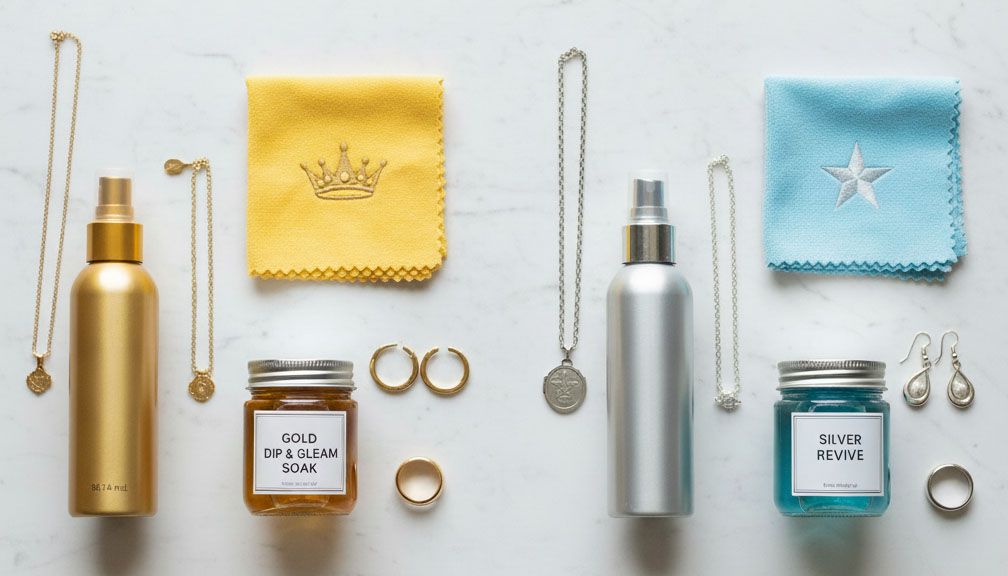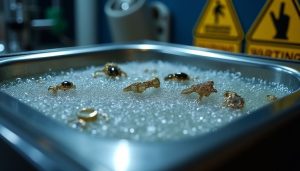Jewelry holds a special place in our hearts as symbols of love, commitment, and elegance. However, over time, even the most cherished pieces can lose their luster. Whether it’s your gold wedding band or your silver necklace, knowing how to properly clean and maintain your jewelry is essential. In this blog post, we will explore the best jewelry cleaners for gold and silver, highlighting the differences and what to consider for each metal.
Why Jewelry Cleaning Matters
Jewelry cleaning is not merely a cosmetic endeavor; it is a vital part of preservation. Dirt, oils from our skin, and environmental factors can tarnish and dull the shine of your jewelry. Regular cleaning can enhance its beauty and longevity.
For gold pieces, maintaining their shine is key to showcasing their inherent value. Silver jewelry, on the other hand, is prone to tarnishing, requiring specialized care to keep it looking pristine. Each metal has unique properties and requires specific cleaning techniques to avoid damaging them.

Understanding the Differences: Gold vs. Silver
Before diving into the best jewelry cleaners, it’s essential to understand the key differences between gold and silver. Gold is a precious metal that is less reactive to tarnishing thanks to its inherent nature. On the contrary, silver is more reactive and tarnishes faster due to its chemical composition, which includes copper.
This fundamental understanding informs how each metal should be cleaned. Gold jewelry can often withstand more aggressive cleaning methods, while silver requires gentle care to maintain its finish.
Best Cleaners for Gold Jewelry
Gold jewelry is usually alloyed with other metals, such as copper or silver. Pure gold (24k) is soft and malleable, thus often not used in jewelry. Most gold jewelry is either 10k, 14k, or 18k, meaning that it contains a certain percentage of gold mixed with other metals for added strength.
1. Mild Soap and Water
For everyday cleaning, a simple solution of mild dish soap and warm water is often sufficient. This method is non-abrasive and gentle, making it suitable for most types of gold jewelry. Soak the pieces for about 15-20 minutes, then gently scrub using a soft brush before rinsing with clean water.
2. Professional Jewelry Cleaners
There are commercial jewelry cleaners formulated specifically for gold. These cleaners often contain ingredients designed to lift dirt without scratching. Look for pH-balanced options that are safe for gold pieces.
3. Ultrasonic Cleaners
Ultrasonic cleaners are devices that use high-frequency sound waves to create tiny bubbles that gently dislodge dirt and grime. For gold jewelry, this method is effective and typically safe, but ensure that any stones set in the gold are secure before using this technique.
Best Cleaners for Silver Jewelry
Silver jewelry is often alloyed with copper, which makes it prone to tarnishing. The cleaning of silver requires a slightly different approach as tarnish can develop quickly. Regular maintenance can help prevent excessive buildup.
1. Baking Soda and Water Paste
Baking soda is an excellent natural cleaner for silver. Mixing it with water creates a paste that can effectively remove tarnish. Apply the paste with a soft cloth or sponge, gently rubbing until the tarnish lifts away.
2. Silver Polishing Cloths
These cloths are specifically designed to clean silver without scratching. They contain a special polishing compound that removes tarnish and leaves a protective layer to slow future tarnishing. Use them regularly for ongoing care and maintenance.
3. Commercial Silver Cleaners
Just as with gold, there are numerous commercial silver cleaners available. Ensure these are safe for jewelry; read product labels to avoid any harsh chemicals that could damage your pieces.
DIY Jewelry Cleaning Solutions
If you prefer a more hands-on approach, there are several DIY cleaning solutions you can create at home for both gold and silver.
Further Reading:
1. Vinegar and Baking Soda Solution
This approach allows you to take advantage of vinegar’s acidity, which can help dissolve tarnish. Add baking soda to vinegar for an effective cleaning paste. Be cautious with this method on delicate gemstones.
2. Alcohol and Water Mix
A mixture of alcohol and water is another simple but effective cleaning solution. This method works well to remove dirt and oils from gold jewelry without causing harm.
Cleaning Tips for Different Jewelry Types
Different types of jewelry may require tailored cleaning approaches. Below are tips for cleaning various common types.
1. Gemstone Accented Pieces
If your gold or silver jewelry features gemstones, approach cleaning with caution. Some stones can be sensitive to certain chemicals and solutions. Generally, it is best to clean the metal and avoid soaking them in any solution.
2. Antique or Vintage Jewelry
Antique pieces often require special care due to their age. It’s advisable to consult a professional jeweler before attempting to clean valuable vintage jewelry to avoid any damage.
3. Pearls and Other Delicate Materials
For pieces that include pearls, avoid harsh chemical cleaners altogether. Instead, opt for a slightly damp soft cloth to gently wipe away any dirt or residue.
The Importance of Regular Maintenance
Cleaning your jewelry is not a one-time task; rather, it should be part of your regular jewelry maintenance routine. Incorporate a quick clean after wearing to prolong the shine and prevent tarnish buildup.
Consider keeping your pieces stored in individual pouches or boxes to keep them from scratching against one another. This combined approach will ensure your jewelry remains as stunning as the day you purchased it.

When to Seek Professional Help
While many cleaning methods can be performed at home, some cases require professional assistance. If you own a particularly valuable piece or if it has intricate details that could be damaged by home cleaning methods, it’s best to consult a professional jeweler.
Additionally, if you notice any loose stones or damage to the metal, professional help is also advised to prevent further deterioration.
Conclusion
Both gold and silver jewelry can be maintained effectively with the right cleaning solutions and techniques. Understanding the unique properties of each metal will help you choose the best cleaning methods and products.
From simple soap and water solutions to professional cleaners, maintaining your jewelry ensures that it continues to sparkle and shine for years to come. Remember, regular upkeep not only serves to keep your pieces looking their best, but it also preserves their sentimental and monetary value.








